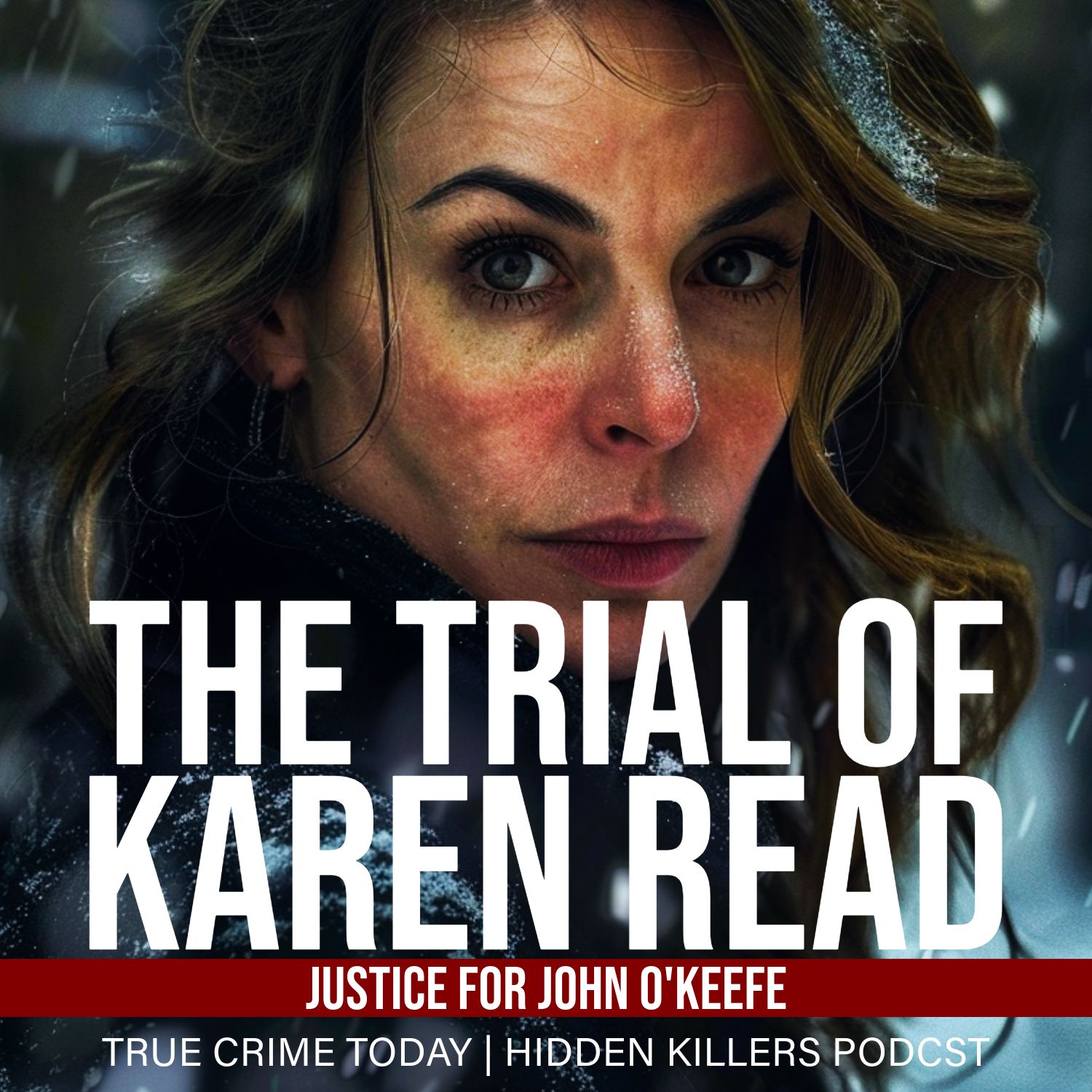
Jennifer Coffindaffer On Week 3 Of The Karen Read Trial
 2024-05-24
2024-05-24
Download
Right click and do "save link as"
In the ongoing trial of Karen Read, the defense has been actively working to create reasonable doubt by poking holes in the prosecution's case. Retired FBI Special Agent and Hidden Killers Daily Contributor Jennifer Coffindaffer recently discussed the trial on the podcast "Hidden Killers With Tony Brueski," expressing surprise at the prosecution's strategy and highlighting key evidence against Read.
During the conversation, Coffindaffer shared her thoughts on the prosecution's approach. "Honestly, my number one reaction is my surprise at the order of proof that the prosecution is going in," she said. Coffindaffer believes that the prosecution should have started chronologically, presenting the case against Karen Read first before addressing alternative theories involving third-party culprits.
The prosecution has presented significant evidence against Karen Read, including her own admissions and forensic evidence linking her vehicle to the victim, John O'Keefe. Coffindaffer noted that three independent paramedics testified that Read admitted to hitting O'Keefe, saying, "I hit him. I hit him. I hit him." Additionally, a police officer testified that Read exclaimed, "It was my fault."
Furthermore, forensic evidence has played a crucial role in the case. "His hair is on the bumper. His DNA is on the tail light pieces. The tail light pieces are embedded in his clothing," Coffindaffer emphasized. This evidence strongly links Read's vehicle to O'Keefe.
Witnesses have also provided testimony that supports the prosecution's case. Several witnesses stated that John O'Keefe never entered the house, which Coffindaffer described as "strong testimony." She added, "If he didn't enter the house, then he was, unfortunately, dead right there."
Despite the strong evidence presented, Coffindaffer expressed concern that the jury might be confused due to the prosecution's disjointed presentation. "I’m worried that they're a little confused," she said. The prosecution's focus on discrediting alternative theories, such as the involvement of a dog or a 17-year-old, has contributed to this confusion.
Coffindaffer highlighted the importance of presenting a clear and cohesive narrative to the jury. "Your time to capture the jury's attention is at the very beginning and at the end," she explained. She hopes that the prosecution will be able to put all the evidence together as they get closer to wrapping up the case.
The trial of Karen Read continues to unfold, with the defense attempting to create reasonable doubt and the prosecution facing criticism for its strategy. The jury's ability to understand and interpret the evidence presented will be crucial in determining the outcome of this case. As Coffindaffer pointed out, presenting a clear and cohesive narrative is essential to ensuring that justice is served.
**#KarenReadTrial #JohnOkeefe #JenniferCoffindaffer #TonyBrueski #ForensicEvidence #ProsecutionStrategy #HiddenKillersPodcast**
Want to listen to ALL of our podcasts AD-FREE? Subscribe through APPLE PODCASTS, and try it for three days free: https://tinyurl.com/ycw626tj
Follow Our Other Cases: https://www.truecrimetodaypod.com
The latest on The Downfall of Diddy, The Karen Read Trial, Catching the Long Island Serial Killer, Awaiting Admission: BTK’s Unconfessed Crimes, Delphi Murders: Inside the Crime, Chad & Lori Daybell, The Murder of Ana Walshe, Alex Murdaugh, Bryan Kohberger, Lucy Letby, Kouri Richins, Malevolent Mormon Mommys, Justice for Harmony Montgomery, The Murder of Stephen Smith, The Murder of Madeline Kingsbury, and much more! Listen at https://www.truecrimetodaypod.com
During the conversation, Coffindaffer shared her thoughts on the prosecution's approach. "Honestly, my number one reaction is my surprise at the order of proof that the prosecution is going in," she said. Coffindaffer believes that the prosecution should have started chronologically, presenting the case against Karen Read first before addressing alternative theories involving third-party culprits.
The prosecution has presented significant evidence against Karen Read, including her own admissions and forensic evidence linking her vehicle to the victim, John O'Keefe. Coffindaffer noted that three independent paramedics testified that Read admitted to hitting O'Keefe, saying, "I hit him. I hit him. I hit him." Additionally, a police officer testified that Read exclaimed, "It was my fault."
Furthermore, forensic evidence has played a crucial role in the case. "His hair is on the bumper. His DNA is on the tail light pieces. The tail light pieces are embedded in his clothing," Coffindaffer emphasized. This evidence strongly links Read's vehicle to O'Keefe.
Witnesses have also provided testimony that supports the prosecution's case. Several witnesses stated that John O'Keefe never entered the house, which Coffindaffer described as "strong testimony." She added, "If he didn't enter the house, then he was, unfortunately, dead right there."
Despite the strong evidence presented, Coffindaffer expressed concern that the jury might be confused due to the prosecution's disjointed presentation. "I’m worried that they're a little confused," she said. The prosecution's focus on discrediting alternative theories, such as the involvement of a dog or a 17-year-old, has contributed to this confusion.
Coffindaffer highlighted the importance of presenting a clear and cohesive narrative to the jury. "Your time to capture the jury's attention is at the very beginning and at the end," she explained. She hopes that the prosecution will be able to put all the evidence together as they get closer to wrapping up the case.
The trial of Karen Read continues to unfold, with the defense attempting to create reasonable doubt and the prosecution facing criticism for its strategy. The jury's ability to understand and interpret the evidence presented will be crucial in determining the outcome of this case. As Coffindaffer pointed out, presenting a clear and cohesive narrative is essential to ensuring that justice is served.
**#KarenReadTrial #JohnOkeefe #JenniferCoffindaffer #TonyBrueski #ForensicEvidence #ProsecutionStrategy #HiddenKillersPodcast**
Want to listen to ALL of our podcasts AD-FREE? Subscribe through APPLE PODCASTS, and try it for three days free: https://tinyurl.com/ycw626tj
Follow Our Other Cases: https://www.truecrimetodaypod.com
The latest on The Downfall of Diddy, The Karen Read Trial, Catching the Long Island Serial Killer, Awaiting Admission: BTK’s Unconfessed Crimes, Delphi Murders: Inside the Crime, Chad & Lori Daybell, The Murder of Ana Walshe, Alex Murdaugh, Bryan Kohberger, Lucy Letby, Kouri Richins, Malevolent Mormon Mommys, Justice for Harmony Montgomery, The Murder of Stephen Smith, The Murder of Madeline Kingsbury, and much more! Listen at https://www.truecrimetodaypod.com
More Episodes
012345678910111213141516171819
Create your
podcast in
minutes
- Full-featured podcast site
- Unlimited storage and bandwidth
- Comprehensive podcast stats
- Distribute to Apple Podcasts, Spotify, and more
- Make money with your podcast
It is Free
- Privacy Policy
- Cookie Policy
- Terms of Use
- Consent Preferences
- Copyright © 2015-2024 Podbean.com






